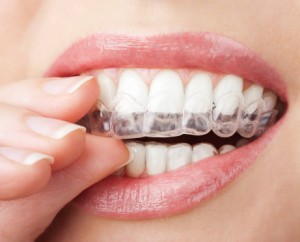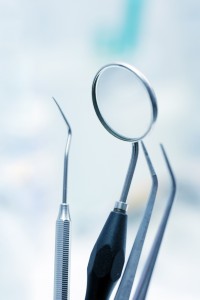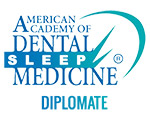 If you’ve ever been told you need braces but said no because of the time, hassle, discomfort, or embarrassment of traditional metal, the ClearCorrect alignment tray system may be right for you. For many years, metal brackets and wires have been used to correct crooked, gapped, and misaligned teeth by tightening wires that pull brackets shifting teeth into proper alignment. Traditional orthodontics are extremely effective, but treatment impacts every aspect of patients’ lives. Bracket and wire braces require regular visits for tightening and adjustment, changes to diet and oral hygiene routines, take as long as 24 months to complete, and give patients a metallic smile. Thanks to advances in orthodontics, our State College, PA dental patients have a more cosmetic, convenient solution: the ClearCorrect alignment tray system.
If you’ve ever been told you need braces but said no because of the time, hassle, discomfort, or embarrassment of traditional metal, the ClearCorrect alignment tray system may be right for you. For many years, metal brackets and wires have been used to correct crooked, gapped, and misaligned teeth by tightening wires that pull brackets shifting teeth into proper alignment. Traditional orthodontics are extremely effective, but treatment impacts every aspect of patients’ lives. Bracket and wire braces require regular visits for tightening and adjustment, changes to diet and oral hygiene routines, take as long as 24 months to complete, and give patients a metallic smile. Thanks to advances in orthodontics, our State College, PA dental patients have a more cosmetic, convenient solution: the ClearCorrect alignment tray system.
(more…)
November 12, 2015
Get the Facts on ClearCorrect Clear Braces State College
July 21, 2015
Proper Tooth Brushing Techniques
 Brushing your teeth may be a habit that you take for granted. After all, most people begin to brush their own teeth around the age of 2 or 3 (with some adult backup), but what many of us don’t realize is we’ve never updated our tooth brushing techniques. Our teeth require different hygiene and care at different stages of our lives. One of the most essential elements of dental hygiene is proper tooth brushing, but if you’re still brushing the way mom or dad taught you as a child, you may not be cleaning your teeth effectively. Let the skilled staff at Donald Marks Family Dentistry help you make the most out of your daily tooth brushing routine. Call to schedule a dental hygiene appointment with our State Park, PA dental practice today.
Brushing your teeth may be a habit that you take for granted. After all, most people begin to brush their own teeth around the age of 2 or 3 (with some adult backup), but what many of us don’t realize is we’ve never updated our tooth brushing techniques. Our teeth require different hygiene and care at different stages of our lives. One of the most essential elements of dental hygiene is proper tooth brushing, but if you’re still brushing the way mom or dad taught you as a child, you may not be cleaning your teeth effectively. Let the skilled staff at Donald Marks Family Dentistry help you make the most out of your daily tooth brushing routine. Call to schedule a dental hygiene appointment with our State Park, PA dental practice today.
Tooth Brushing Recommendations from the Dentist State College, PA Trusts
When it comes to brushing, we recommend double checking the basics:
- Brush twice a day – brushing once in the morning and once before going to sleep is routine, and a 3rd brushing following your afternoon meal can be beneficial as well. However, all things should be done in moderation, and this includes tooth brushing. Done more than 3 times a day, brushing can damage gums.
- Check your brush – If you’re using a brush labeled “hard bristled,” one that is not American Dental Association approved, or one that is more than 3 or 4 months old, throw it out and get a new one. The ideal tooth brush should be soft or extra soft bristled to minimize damage to gums and maximize dental cleaning results. Always look for the ADA seal of approval when purchasing dental hygiene items as these have undergone more rigorous testing for effectiveness. Replace toothbrushes every 3 to 4 months to prevent contamination and maintain optimal brushing effectiveness. This includes mechanical tooth brushes. Make sure to purchase a mechanical brush that has replaceable heads.
- Check the clock – If you’re not brushing for at least two minutes, you are not thoroughly cleaning each tooth. Brushing longer than two minutes is even better. Many people gauge their brushing time using a timer, by brushing for the length of an entire song, or by brushing through a commercial break on television. Whatever trick you use, make sure to set aside at least 2 minutes every morning and evening to brush your teeth.
- Brush gently – Whether you apply a great deal of pressure while you brush or just a little, you are likely going to remove the same amount of plaque from your teeth and gums. Brush gently to avoid damaging soft tissue or causing gum recession. Holding your toothbrush with only 2 to 3 fingers like a pen, pencil, or paintbrush is a great way to build the habit of brushing with less pressure.
The Bass Method for Brushing
Many people are taught to brush their teeth as children using big circles or back and forth motions with the bristles flat against the outside and tops of teeth. Many children are never taught to brush the inside of their teeth at all. While these methods may be effective for children with poor hand eye coordination who are just developing the necessary motor skills to keep up their hygiene, there’s a reason we don’t brush our hair or wash our bodies the way we did when we were 3. Why would we continue to brush our teeth that way? For patients who want to start a more effective brushing routine, the Bass method is an option the team at Donald Marks Family Dentistry highly recommends.
How the Bass method works:
- Place your brush at a 45 degree angle to your teeth, against the gum line.
- Quickly move the toothbrush back and forth. The bristles should remain stationary while only your hand and the brush move.
- Count to ten, gently flick the bristles toward the biting surface of your tooth to shift plaque out from under gums, and proceed to the next tooth.
- Continue this process for each tooth inside and out.
- To clean the tops of teeth, place the brush flat on your biting surface and move back and forth keeping bristles stationary as you did with your other teeth.
- Count to ten and move to the next tooth. Continue until each tooth has been cleaned.
The Bass brushing method is preferred by many dentists and hygienists because it encourages increased periodontal care, and maximizes the effectiveness of each brush stroke. Ask your dental hygienist to explain or demonstrate effective brushing techniques for your, unique bite next time you visit our office.
Contact us for More Information
We’re always here to help, no matter what your dental care needs, but we’re dedicated to improved preventive care so our patients are more likely to retain their natural smiles for life. Call Donald Marks Family Dentistry to schedule an appointment today. Our State College, PA dental practice welcomes patients from neighboring communities Spring Mills, Centre Hall, Huntingdon, Altoona, Penns Valley, Boalsburg, Lemont, Bellefonte, Lewistown, and Phillipsburg.
October 10, 2014
Dental Health for Athletes
 If you are an athlete or you lead an athletic lifestyle, your physical fitness is a top priority. Yet many athletes don’t realize that good dental health is an important part of achieving top physical performance. Recent studies have even found that hundreds of world class Olympic athletes suffer from dental hygiene issues regularly. This is because many of the habits that athletes develop to maintain their physical condition can lead to dental problems like tooth decay and gum disease. Dr. Marks and Dr. Martin help athletes keep their teeth and gums healthy at his University Drive dental office in State College, PA. You can make an appointment with the doctors today to proactively tackle your oral health.
If you are an athlete or you lead an athletic lifestyle, your physical fitness is a top priority. Yet many athletes don’t realize that good dental health is an important part of achieving top physical performance. Recent studies have even found that hundreds of world class Olympic athletes suffer from dental hygiene issues regularly. This is because many of the habits that athletes develop to maintain their physical condition can lead to dental problems like tooth decay and gum disease. Dr. Marks and Dr. Martin help athletes keep their teeth and gums healthy at his University Drive dental office in State College, PA. You can make an appointment with the doctors today to proactively tackle your oral health.
Dental Health Concerns for Athletes
One risk of decay is caused by the daily use of sports drinks, which can actually be more damaging to teeth than sodas because of high acidity and large amounts of sugar. Athletes often have intense training regimens that require maximum physical performance. To refuel during these workouts, many athletes consume energy and sports drinks, protein bars, and eat frequent meals throughout the day, all of which can be detrimental to your oral heal. Excessive sweating could also cause dehydration, which reduces the amount of saliva in the mouth. Saliva plays a vital role in protecting the teeth from decay by rinsing away harmful bacteria and restoring tooth enamel. Athletes can place a lot of stress on their teeth from clenching and grinding while exerting maximum effort during training or competitions. These habits can also wear down the health of an athlete’s teeth and worsen the damage caused by tooth decay. Athletes also have an elevated risk of tooth, gum and lip injuries.
Dental Health Care for Athletes in State College, PA
There are important steps to take to protect the health of your teeth and gums if you are an athlete or lead an athletic lifestyle. The first is to switch from sports drinks to water to keep hydrated. Also, try to gut down on supplements or meal replacements that are high in sugar. To protect teeth from injury, and to minimize the effects of clenching or grinding your teeth, it’s also important to wear a custom fitted mouthguard. Due to the increased risks of dental problems, athletes should also see a dentist more often than non- athletes. You can contact Dr. Marks and Dr. Martin today to schedule your next appointment. Dr. Marks and Dr. Martin are conveniently located on University Drive in State College, PA and proudly serves patients from surrounding Park Forest Village, Spring Mills, Centre Hall, Huntingdon, Altoona, Penns Valley, Boalsburg, Lemont, Bellefonte, Lewiston, Philipsburg, Port Matilda, University Park, Pleasant Gap, and Hollidaysburg.
August 9, 2013
Why Is General Dentistry Important?
 Patients of all ages need general dental care. Why? Because a patient becomes vulnerable to common oral health conditions like tooth decay and gum disease the minute his or her first tooth comes in. The goal with general dentistry from Dr. Donald Marks and Dr. John A. Martin is to prevent these conditions through close oral exams and thorough cleanings.
Patients of all ages need general dental care. Why? Because a patient becomes vulnerable to common oral health conditions like tooth decay and gum disease the minute his or her first tooth comes in. The goal with general dentistry from Dr. Donald Marks and Dr. John A. Martin is to prevent these conditions through close oral exams and thorough cleanings.
Left untreated, problems like these can develop and dramatically impact one’s oral, and even overall, wellbeing. Gum disease, for instance, is the number one cause of adult tooth loss in America. What’s more, studies have connected it to an increased vulnerability to other kinds of health problems, like diabetes, pre-term birth, Alzheimer’s, stroke, and possibly even heart disease. With regular care from your State College general and family dentist, your family can look forward to enjoying a healthier smile and a better sense of overall health.
During your regular appointment, your dentist will look for more than just cavities and gum disease, though. Your State College general dentist will also look for signs of oral cancer or a neuromuscular condition like bruxism or TMJ dysfunction. Depending on the results of your exam, additional care may be recommended with fillings, periodontal care, a smile makeover, or some other cosmetic or restorative service. Plus, services like dental sealants and fluoride treatments can be used to give teeth—especially young teeth—extra protection.
How often should you see your general dentist? We recommend coming in every six months to make sure that your smile stays healthy. Call your local general dentist for an appointment if it’s been more than six months since your last visit. And be sure you bookmark our blog to learn more about our services and important oral healthcare tips.




